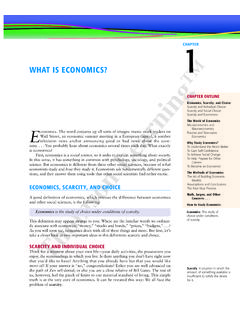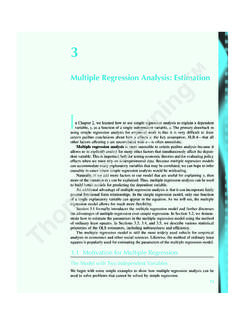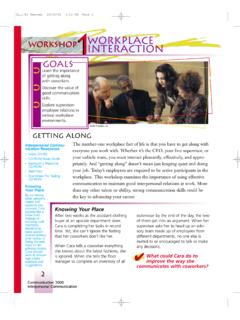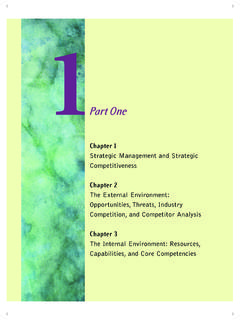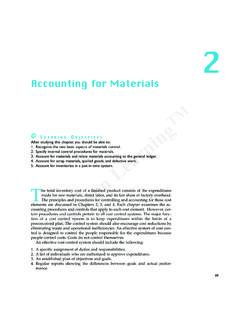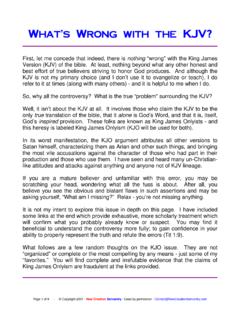Transcription of FINANCIAL MANAGEMENT AND VALUE CREATION: AN …
1 CHAPTER1 FINANCIAL MANAGEMENTAND VALUE CREATION: AN OVERVIEWAn executive cannot be an effective manager without a clear understanding ofthe principles and practices of modern finance. The good news is that theseprinciples and practices can be communicated simply without sacrificing thorough-ness or rigor. Indeed, you will discover that most of the concepts and methodsunderlying modern corporate finance are based on business common sense. But,translating business common sense into an effective MANAGEMENT system can be areal challenge. It requires, in addition to a solid understanding of fundamental prin-ciples, the determination and the discipline to manage a business according to theprecepts of modern finance.
2 Consider, for example, one of FINANCIAL MANAGEMENT smost useful guiding principles:Managers should manage their firm s resources with the objective ofincreasing the firm s market may seem to be an obvious statement. But, you probably know a numberof companies that are not managed to their full potential VALUE . You may even knowwell-intentioned managers who are VALUE destroyers. Their misguided actions, orlack of actions, actually reduce the VALUE of their do you manage for VALUE creation? This book should help you find theanswer. Our main objective is to present and explain the methods and tools thatwill help you determine whether the firm s current investments are creating valueand, if they are not, what remedial actions should be taken to improve also show you how to determine whether a business proposal such as thedecision to buy a piece of equipment, launch a new product, acquire another firmor restructure existing operations has the potential to raise the firm s.
3 We show you that managing with the goal of raising the firm s VALUE pro-vides the basis for an integrated FINANCIAL MANAGEMENT system that not only helpsyou evaluate actual business performance and make sound business decisions but1also helps you design effective MANAGEMENT compensation packages compensa-tion packages that align the interests of the firm s managers with those of thefirm s introductor y chapter reviews some of the most challenging issues andquestions raised by modern corporate finance and gives a general but comprehen-sive over view. Although the topics of this chapter are examined in detail in laterchapters, many of the important terms and concepts are introduced and definedhere.
4 After reading this chapter, you should understand: The meaning of managing a business for VALUE creation. How to measure the VALUE that may be created by a business proposal,such as an investment project, a change in the firm s FINANCIAL structure, abusiness acquisition, or the decision to invest in a foreign countr y. The significance of the firm s cost of capital and how it is measured. The function of FINANCIAL markets as a source of corporate funds and therole they play in the VALUE -creation process. A firm s business cycle and how it determines the firm s capacity to grow.
5 The basic structure and the logic behind a firm s balance sheet, incomestatement, and cash flow statement. Risk, how to measure it and how it affects the firm s cost of capital. The terms market VALUE added and economic VALUE added and howthey relate to the goal of managing for VALUE KEY QUESTION: WILL YOUR DECISION CREATE VALUE ?Suppose you have identified a need in the marketplace for a new product. Youbelieve you can manufacture that product cheaply and rapidly. You are even confi-dent you can sell it for a tidy profit. Should you go ahead? You should not make thisdecision until after you check the project s long-term FINANCIAL viability.
6 How willyour firm finance the project? Where will the money come from? Will the project besufficiently profitable to cover the cost of the funds required to support it? More tothe point, will the firm be more valuable withthe project or withoutit? We believethat you should answer these questions before making a final most cases, the proposed venture will not be financed with your money. Itwill be financed by the firm s owners, its shareholders(you may be one of them),and by those who lend money to the firm, the debtholders. Cash contributed byshareholders is called equity capital; cash contributed by lenders is debt with any other resource, capital is not free.
7 It has a cost. Your venture will attractoutside capital only if it is sufficiently profitable to cover the cost of that capital. Butthis will probably not be enough to convince the firm s owners to let you go aheadwith the project. The firm s owners want to increasethe firm s VALUE , and in orderto do this, a project s expected return must exceedits financing cost. In other words,2 FINANCE FOR EXECUTIVESCHAPTER 1 FINANCIALMANAGEMENT ANDVALUECREATION: ANOVERVIEW31 Fortune(March 4, 1996).before deciding to go ahead with a business proposal, you should ask yourself theKey Question:Will the proposal raise the firm s market VALUE ?
8 If, in light of existing information and proper analysis, you can confidentlyanswer yes, then go ahead. Other wise, you should abandon the Key Question applies not only to a business proposal but also to currentoperations. If some existing investments are destroying rather than creating VALUE ,you should take immediate corrective actions. If these actions fail to improve per-formance, you should seriously consider selling those IMPORTANCE OF MANAGING FOR VALUE CREATIONWe realize, of course, that the Key Question is much easier asked than next section describes how to apply the fundamental finance principleto helpyou answer the question.
9 Before introducing that principle, we want to explain whythe paramount objective of MANAGEMENT should be the creation of VALUE for the firm sowners. This objective makes business common sense if you think about a firm thatfails to create VALUE for its owners: it will be unable to attract the equity capital itneeds to fund its activities. And without equity capital, no firm can sur may rightly ask whether we are forgetting the contributions of employees,customers, and suppliers. No firm can succeed without them. Great companies donot only have satisfied shareholders; they also have loyal customers, motivatedemployees, and reliable suppliers.
10 The point, of course, is not to neglect customers,squeeze suppliers, or ignore the interest of employees for the benefit of owners:More VALUE for shareholders does not mean less VALUE for employees, customers, orsuppliers. On the contrar y, firms managed with a focus on creating VALUE for theirshareholders are among those that have built durable and valuable relationshipswith their customers, employees, and suppliers. They know that dealing success-fully with employees, customers, and suppliers is an important element in achievingtheir ultimate objective of creating VALUE for their , there is evidence that firms that take care of their customers andemployees also deliver VALUE to their shareholders.
